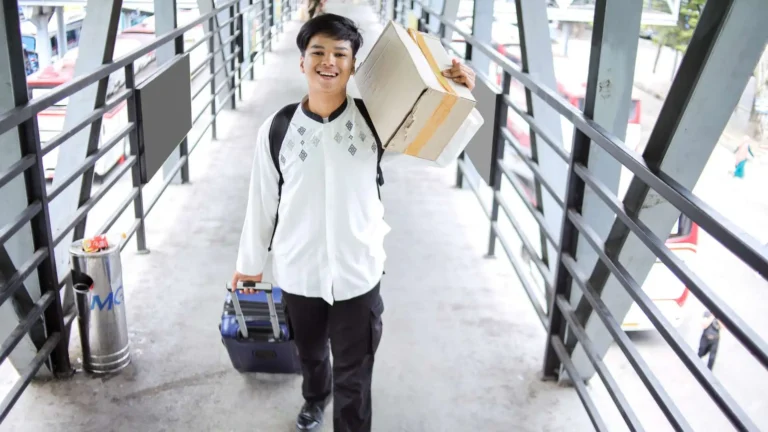Off-campus moving is a huge decision in a student’s life.. It is a moment to cherish and to establish your own environment. But before you go around signing a lease, create a budget to remain financially secure.
Without a healthy budget, unexpected expenses can add up in no time. This can turn your dream lifestyle into a money pit. That’s where Blitz comes in. With Blitz’s BudgetGPT and PriceGPT, you can track rent, bills, and lifestyle expenses, avoiding any surprises.
Are you ready to take control of your finances before this big move? Let’s go through this budget list to make moving off-campus smooth and hassle-free.
Key Budget Categories to Consider Before Signing a Lease
Budget before you sign your lease and pack. Off-campus moving can be fun, but surprise expenses can be damaging to your finances. Here are the major categories to consider.
Rent and Security Deposit
Of the monthly payments, rent is usually the largest. The rent each month should fit well in your budget. Do not forget to take care of the first and last month’s rent and security deposit apart from rent. Blitz’s BudgetGPT can assist you in monitoring rent payments and apartment comparisons.
Utilities: What’s Included and What’s Not
Utilities can quickly add up. Some houses may come with water, electricity, or the internet included, while others may not. It is always better to be sure of what is coming and what is going before you put your signature on a lease. Typical separate utilities are electricity, water, gas, and internet. Blitz’s expense tracker takes care of these costs each month.
Furnishings and Initial Setup Costs
Setting up your new place can be a huge expense, especially if you don’t have anything ready. You will also need a bed, a sofa, kitchenware, and appliances. Blitz’s PriceGPT makes it easier to compare prices to ensure that you stay within budget while furnishing your new home.
Renter’s Insurance
Get renters’ insurance before the things you own are lost in a fire or are stolen. It is generally quite cheap and also covers you from theft or loss. Find coverage that suits your requirements and price range. Blitz’s DealsGPT assists students in getting the best insurance offers without the inconvenience.
Recurring Monthly Costs to Account For
When you go off-campus, there are a few regular monthly expenses to remember. These charges can easily add up if you are not mindful. These are the most important categories of monthly charges that you will want to factor into your consideration.
Internet and Cable
Evaluating cable and internet prices is necessary for off-campus living. Determine if paying for internet as part of cable packages is more advantageous or if sticking with internet-only plans is the best. Blitz’s PriceGPT will aid in comparing your area.
Groceries and Household Items
Groceries may be a big monthly expense. Budget for food, snacks, and toiletries by meal planning and making shopping lists. BudgetGPT of Blitz can be your assistant in budgeting groceries and tracking the money you spend on food and household items.
Transportation: Car, Gas, Parking, or Public Transit
Transportation costs include gas, parking fees, and public transport charges. Choose the most affordable and practical transport option for your area. Use Blitz’s expense tracker to see your transportation spending and stay on budget.
Laundry and Cleaning
Don’t overlook the cost of laundry and cleaning. Whatever you do on-site or purchase at a laundromat, these charges are actual. Blitz’s BudgetGPT can help you plan for laundry and everyday cleaning products to keep your space clean.
How to Calculate Total Monthly Living Costs
Get to know your monthly expenses before renting your new home. Your monthly expenses have two categories: fixed and variable. Here’s how to compute them:
Adding Up Fixed Costs vs. Variable Costs
While drawing your budget, label your expenses as either fixed costs or variable costs.
- Fixed costs: These are certain things that you pay every month, and they do not change. For example, rent and utility bills.
- Variable costs: These are those that can change. Food, transport, and entertainment can be examples of variable expenses.
Blitz’s BudgetGPT helps you monitor both fixed and variable costs each month, allowing you to have a better idea of your money. Here’s how to Save on Food, Fashion, and Fun: Inside the DealsGPT Experience
Creating an Emergency Fund
A few emergencies happen, such as medical fees or a sudden breakdown of the car. An unexpected situation is the case that makes it necessary for one to have an emergency cash fund. Put aside $50 to $100 every month to build your fund.
With Blitz, you can automate savings for emergencies, which makes it easy to prepare for what comes along.
Extra Considerations to Ensure Financial Stability
It is essential to have financial stability when you think of moving off-campus. Beyond rent and utilities, keep an eye out for hidden fees, shared costs with roommates, and discretionary spending. Here are some points to help you manage your finances:
Assessing the Lease Agreement: Hidden Fees and Terms
When signing a lease, the very first thing you must do is check the fine print. There may be surprise fees you didn’t agree to, like late fees, repair charges, or prepayment penalties. You’ll know what to expect if you read the clauses about rent increases and utilities. Look for the following:
- Check the lease for additional fees carefully
- Check for rent increase and utility clauses
- Verify maintenance and repair policies
Blitz’s DealsGPT can assist you in discovering leases with excellent value and steering clear of surprise charges so you’re not stuck with a surprise bill.
Roommates and Shared Expenses
Sharing a place with one or more people can cut down your expenses, but, at the same time, it takes up your time doing all the talking you have to do. This is how it is done:
- Discuss who will pay for what: rent, utilities, and other bills
- Write and sign a paper contract to avoid disputes related to it
- Use apps such as Blitz’s expense tracker to split the costs
By involving everyone through open discussions and agreements, you get to know the expenses and eliminate the problem of fights that might follow.
Budgeting for Personal Entertainment and Discretionary Spending
One can easily overspend. Such expenses can catch up with your budget quickly. Leave some room for fun while keeping key expenses in check. This is what you can do:
- Set a limit for discretionary spending and entertainment each month
- Be mindful of spending so that it doesn’t affect rent or bills
- Save for enjoyable activities without sacrificing your overall financial objectives
Blitz’s BudgetGPT assists you in budgeting for enjoyment, so you can live off-campus without sacrificing your primary financial obligations.
Final Steps Before Signing the Lease
Before you even sign that lease and start your new off-campus living situation, look one last time at your finances. You do not want to move in and realize that your budget does not accurately depict reality.
Review Your Budget and Ensure It’s Realistic
Now that you have jotted down all of your expenditures, take one last look at your budget. Compare your estimated monthly expenditures and balance them against your income or scholarship.
Make the changes that you consider necessary immediately. Blitz’s tools can assist you in making your budget visual and preventing any expenses from slipping through the cracks.
Saving for Moving Day and Future Expenses
Taking off-campus involves budgeting for additional expenses. Renting a truck or hiring movers is something you’ll need to pay for, and it can really add up. It’s also a good idea to budget for your first few months of off-campus living to prevent yourself from getting overextended. Utilize Blitz’s savings tools to budget for those expenses and maintain your finances in check.
Conclusion – Set Yourself Up for Financial Success in Your New Home
It doesn’t have to be complicated to manage your money when you’re living off campus. Blitz makes it easy to plan, save, and keep track of your spending. From budgeting for rent to saving for moving expenses, Blitz makes it all a breeze so that you can keep an eye on your financial priorities.
With Blitz, you can save automatically, track progress, and make better decisions. It keeps everything in order, so you don’t get surprised when it’s rent time or paying other living costs.
Get started with Blitz today and get on top of your finances. It’s a simple way to budget, save, and make your move a walk in the park!
FAQs About Moving Off-Campus and Budgeting
How can I afford to move off-campus on a student budget?
Moving off-campus is a costly venture, but it is for sure doable with smart budgeting. You must initiate tracking of every expense, be it for rent, utilities, or a one-time purchase. Blitz is there to help you by creating an achievable budget and a savings plan that is enough for the required expenses.
What should I do if my rent is more than I can afford?
If your rent is consuming too much of your budget, then look for a cheaper place before everything else. You can get social roommates and share the rent. As a result, your expenses will be lowered. Moreover, try to see if getting a part-time job or cutting back on the non-essentials is are realistic option for you.
How can I split costs fairly with my roommates?
Open communication is important. Discuss dividing rent, utilities, and common expenses upfront. Software such as Blitz can calculate individual contributions so that everyone contributes a fair share.
Should I buy new furniture or get second-hand?
Second-hand furniture is a great way for cash-strapped students to furnish their apartments. Check out thrift stores, e-commerce shops, or friends. Blitz’s PriceGPT can help you compare prices and keep within your budget while decorating your living space.
How can I track all my moving and living expenses in one place?
Blitz has made the task of tracking your expenses a very simple one. In the app, all your rent, bills, groceries, and other expenses are seamlessly grouped in a single location.





